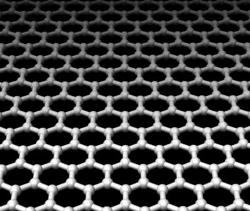Mar 11 2010
Scientists have leaped over a major hurdle in efforts to begin commercial production of a form of carbon that could rival silicon in its potential for revolutionizing electronics devices ranging from supercomputers to cell phones.
 This graphic represents an atom-thin sheet of graphene, a form of carbon that could replace silicon in future electronic devices. Scientists have developed a simple manufacturing method that could allow its mass production.
This graphic represents an atom-thin sheet of graphene, a form of carbon that could replace silicon in future electronic devices. Scientists have developed a simple manufacturing method that could allow its mass production.
Called graphene, the material consists of a layer of graphite 50,000 times thinner than a human hair with unique electronic properties. Their study appears in ACS' Nano Letters, a monthly journal.
Victor Aristov and colleagues indicate that graphene has the potential to replace silicon in high-speed computer processors and other devices. Standing in the way, however, are today's cumbersome, expensive production methods, which result in poor-quality graphene and are not practical for industrial scale applications.
Aristov and colleagues report that they have developed "a very simple procedure for making graphene on the cheap." They describe growing high-quality graphene on the surface of commercially available silicon carbide wafers to produce material with excellent electronic properties. It "represents a huge step toward technological application of this material as the synthesis is compatible with industrial mass production," their report notes.
Source: http://portal.acs.org/